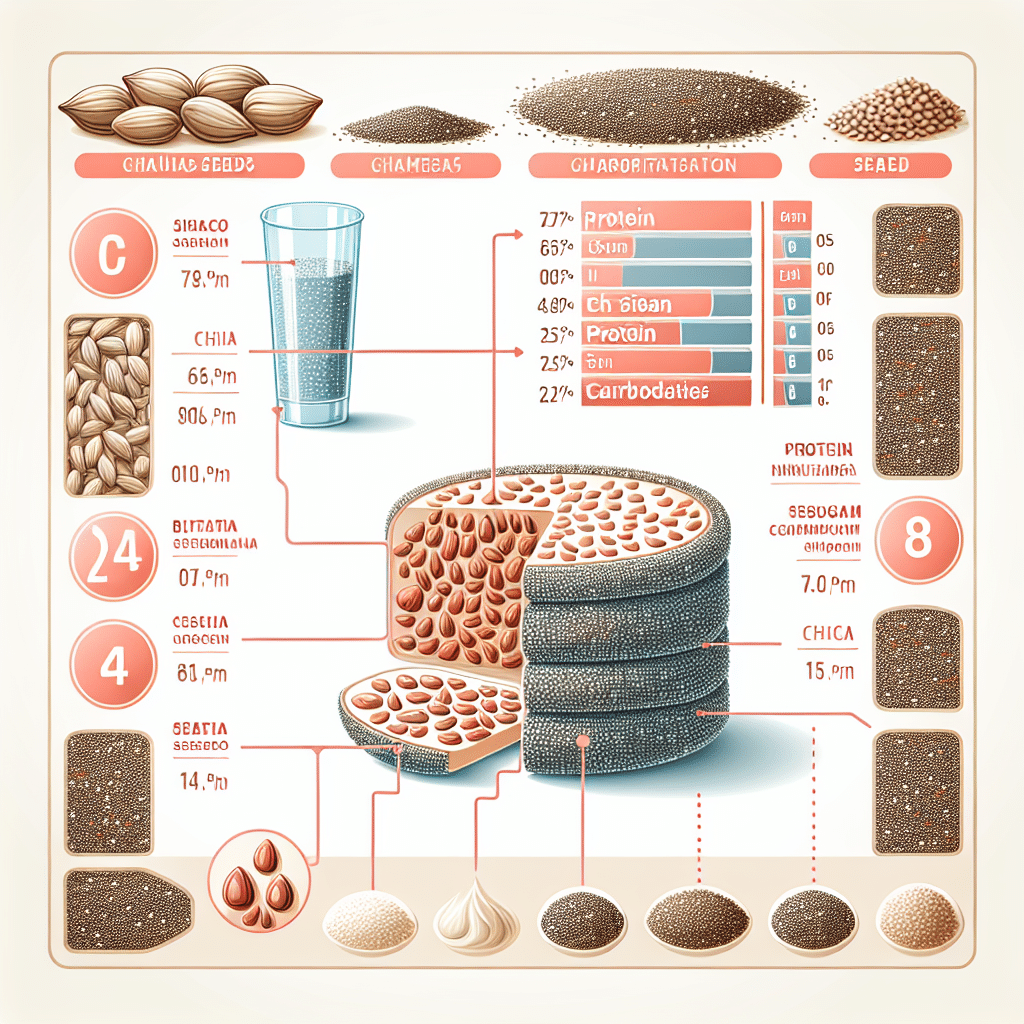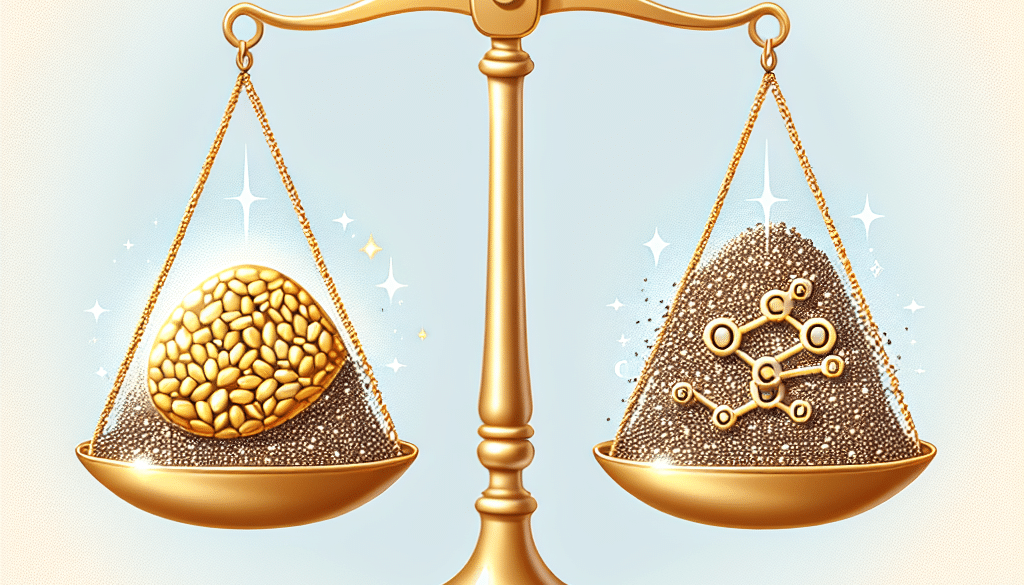Is Chia A Protein Or Carb?
-
Table of Contents
- Chia Seeds: Unveiling the Protein and Carb Content
- Understanding Chia Seeds: A Nutritional Overview
- Carbohydrate Content in Chia Seeds
- Protein Content in Chia Seeds
- Breaking Down the Numbers: Chia Seeds’ Macronutrient Ratio
- Health Benefits of Chia Seeds
- Chia Seeds in a Balanced Diet
- Conclusion: Chia Seeds as a Nutrient-Dense Superfood
- Discover ETprotein’s High-Quality Protein Products
Chia Seeds: Unveiling the Protein and Carb Content

Chia seeds have gained immense popularity in the health food scene over the past few years. Touted for their nutritional benefits and versatility, these tiny seeds are often incorporated into a variety of diets. However, there is some confusion about whether chia seeds are a protein or carb source. This article delves into the nutritional profile of chia seeds to clarify their role in a balanced diet.
Understanding Chia Seeds: A Nutritional Overview
Chia seeds are derived from the Salvia hispanica plant, native to central and southern Mexico. They are small, flat, and oval-shaped with a shiny and smooth texture. When it comes to their nutritional makeup, chia seeds are a powerhouse containing carbohydrates, protein, fats (mostly omega-3 fatty acids), dietary fiber, vitamins, and minerals.
Carbohydrate Content in Chia Seeds
Carbohydrates are one of the three macronutrients and are a primary source of energy for the body. Chia seeds contain a significant amount of carbohydrates, but it’s important to note that a large portion of these carbs is actually fiber. The fiber in chia seeds is mostly soluble, which has various health benefits, such as improving digestive health and lowering cholesterol levels.
Protein Content in Chia Seeds
Protein is another essential macronutrient, vital for building and repairing tissues, among other functions. Chia seeds are an excellent source of plant-based protein, which is particularly beneficial for vegetarians and vegans. The protein in chia seeds includes all nine essential amino acids, making it a complete protein source.
Breaking Down the Numbers: Chia Seeds’ Macronutrient Ratio
To truly understand whether chia seeds are more of a protein or carb, it’s crucial to look at their macronutrient ratio. According to the USDA, a 28-gram (1-ounce) serving of chia seeds typically contains:
- Carbohydrates: 12 grams
- Dietary Fiber: 10 grams
- Protein: 4.7 grams
- Total Fat: 8.6 grams
From these numbers, it’s clear that chia seeds have a higher carbohydrate content than protein. However, because most of the carbs in chia seeds are fiber, they have a low net carb content, which is the total carbs minus the fiber. This makes chia seeds an attractive option for low-carb diets.
Health Benefits of Chia Seeds
Chia seeds offer a range of health benefits, largely due to their high fiber and omega-3 fatty acid content. Here are some of the key health benefits associated with chia seeds:
- Weight Management: The fiber in chia seeds can absorb a significant amount of water and expand in the stomach, which may help to increase fullness, slow absorption of food, and reduce calorie intake.
- Heart Health: Chia seeds are rich in alpha-linolenic acid (ALA), a type of omega-3 fatty acid that has been linked to a reduced risk of heart disease.
- Blood Sugar Control: The soluble fiber in chia seeds can help to stabilize blood sugar levels by slowing down the rate at which glucose is absorbed into the bloodstream.
- Bone Health: Chia seeds are a good source of calcium, phosphorus, magnesium, and protein, all of which are essential for bone health.
Chia Seeds in a Balanced Diet
Given their nutritional profile, chia seeds can be a valuable addition to a balanced diet. They can be easily incorporated into meals and snacks. Here are some examples:
- Added to smoothies or yogurt for a protein and fiber boost
- Used as a topping for salads or oatmeal
- Mixed with water to form a gel-like substance, known as chia pudding
- Incorporated into baked goods as a source of healthy fats and to improve texture
Conclusion: Chia Seeds as a Nutrient-Dense Superfood
In conclusion, chia seeds are both a source of carbohydrates and protein, with a significant portion of their carbs coming from dietary fiber. They are a nutrient-dense superfood that can contribute to various health benefits when included as part of a balanced diet. Whether you’re looking to increase your protein intake, reduce your carb consumption, or simply add more nutrients to your meals, chia seeds are a versatile and healthy choice.
Discover ETprotein’s High-Quality Protein Products
If you’re looking to complement your diet with additional protein sources, consider exploring ETprotein’s range of organic bulk vegan proteins. ETprotein offers a variety of plant-based proteins, including organic rice protein, pea protein, and more, catering to different dietary needs and preferences. Their products are characterized by a neutral taste, non-GMO, and allergen-free attributes, ensuring you receive the highest quality protein supplements.
About ETprotein:
ETprotein, a reputable protein and L-(+)-Ergothioneine (EGT) Chinese factory manufacturer and supplier, is renowned for producing, stocking, exporting, and delivering the highest quality organic bulk vegan proteins and L-(+)-Ergothioneine. They include Organic rice protein, clear rice protein, pea protein, clear pea protein, watermelon seed protein, pumpkin seed protein, sunflower seed protein, mung bean protein, peanut protein, and L-(+)-Ergothioneine EGT Pharmaceutical grade, L-(+)-Ergothioneine EGT food grade, L-(+)-Ergothioneine EGT cosmetic grade, L-(+)-Ergothioneine EGT reference grade and L-(+)-Ergothioneine EGT standard. Their offerings, characterized by a neutral taste, non-GMO, allergen-free attributes, with L-(+)-Ergothioneine purity over 98%, 99%, cater to a diverse range of industries. They serve nutraceutical, pharmaceutical, cosmeceutical, veterinary, as well as food and beverage finished product distributors, traders, and manufacturers across Europe, USA, Canada, Australia, Thailand, Japan, Korea, Brazil, and Chile, among others.
ETprotein specialization includes exporting and delivering tailor-made protein powder and finished nutritional supplements. Their extensive product range covers sectors like Food and Beverage, Sports Nutrition, Weight Management, Dietary Supplements, Health and Wellness Products, and Infant Formula, ensuring comprehensive solutions to meet all your protein needs.
As a trusted company by leading global food and beverage brands and Fortune 500 companies, ETprotein reinforces China’s reputation in the global arena. For more information or to sample their products, please contact them and email sales(at)ETprotein.com today.












